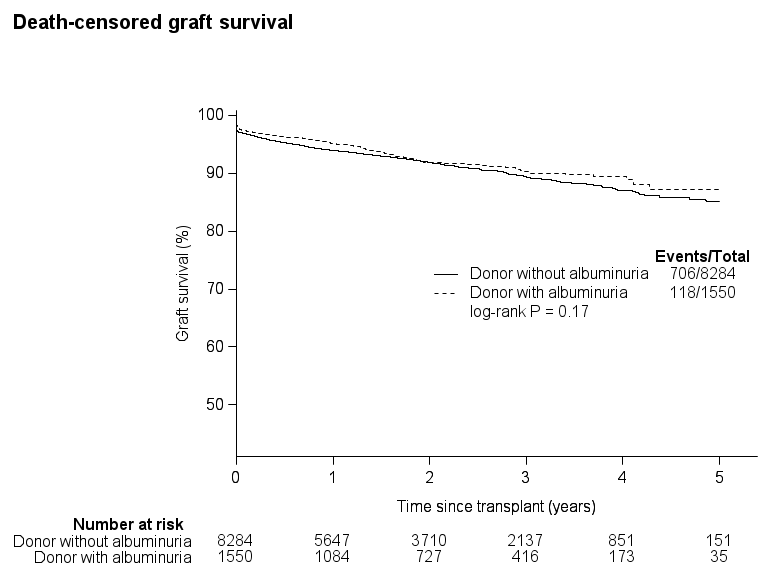Utilisation and Clinical Outcomes of Kidney Transplants from Deceased Donors with Albuminuria in the UK: A Cohort Study
1NHS Blood and Transplant, Bristol, United Kingdom, 2Guy's Hospital, London, United Kingdom, 3London School of Hygiene and Tropical Medicine, London, United Kingdom, 4University of Cambridge, Cambridge, United Kingdom
Meeting: 2022 American Transplant Congress
Abstract number: 203
Keywords: Cadaveric organs, Graft survival, Kidney transplantation, Proteinuria
Topic: Clinical Science » Kidney » 32 - Kidney Deceased Donor Selection
Session Information
Session Name: Kidney Deceased Donor Selection I
Session Type: Rapid Fire Oral Abstract
Date: Monday, June 6, 2022
Session Time: 3:30pm-5:00pm
 Presentation Time: 4:20pm-4:30pm
Presentation Time: 4:20pm-4:30pm
Location: Hynes Ballroom C
*Purpose: Urinalysis is a standard component of the assessment of potential deceased kidney donors in the UK. The value of albuminuria as a biomarker for kidney quality is uncertain. We examined the relationship between donor albuminuria and renal graft utilisation, survival, and function.
*Methods: We performed a national cohort study on adult deceased donors and kidney transplant recipients between 2016 and 2020, using data from the UK Transplant Registry. We examined the influence of donor albuminuria, defined as ≥2+ protein on dipstick testing, on kidney utilisation, early graft function, graft failure, and estimated glomerular filtration rate (eGFR).
*Results: Eighteen percent (1,681/9,309) of consented donors in the study period had albuminuria. After adjustment for confounders, albuminuria was associated with a lower likelihood of kidney utilisation (57% vs. 68%; OR 0.76, 95% CI 0.67 to 0.86). Of the 9,834 kidney transplants included in our study, 1,550 (16%) came from donors with albuminuria. After a median follow-up of 2 years, graft failure occurred in 8% (118/1,550) and 9% (706/8,284) of transplants from donors with and without albuminuria, respectively. There was no association between donor albuminuria and graft failure (adjusted HR 0.88, 95% CI 0.72 to 1.08). There was also no association with delayed graft function, primary non-function, patient survival, or eGFR at 1 or 3 years.
*Conclusions: Our study suggests reluctance in the UK to utilise kidneys from deceased donors with albuminuria but no evidence of an association with graft survival or function. This highlights the potential to safely expand organ utilisation without negatively impacting transplant outcomes.
| Transplants from donors with <2+ albuminuria (n=8,284) | Transplants from donors with ≥2+ albuminuria (n=1,550) | |
| Donation after brain death | 4,978 (60%) | 868 (56%) |
| Donor diabetes | 625 (8%) | 128 (8%) |
| Donor terminal creatinine (µmol/L) | 65 (52 – 84) | 73 (56 – 101) |
| KDRI (Rao) | 1.45 (1.15 – 1.87) | 1.41 (1.14 – 1.81) |
| Recipient female sex | 3,106 (37%) | 568 (37%) |
| Recipient age (yr) | 54 (44 – 63) | 55 (43 – 64) |
| Recipient diabetes | 1,009 (12%) | 188 (12%) |
To cite this abstract in AMA style:
Greenhall G, Robb M, Johnson R, Ibrahim M, Hilton R, Tomlinson L, Callaghan CJ, Watson C. Utilisation and Clinical Outcomes of Kidney Transplants from Deceased Donors with Albuminuria in the UK: A Cohort Study [abstract]. Am J Transplant. 2022; 22 (suppl 3). https://atcmeetingabstracts.com/abstract/utilisation-and-clinical-outcomes-of-kidney-transplants-from-deceased-donors-with-albuminuria-in-the-uk-a-cohort-study/. Accessed February 21, 2026.« Back to 2022 American Transplant Congress

